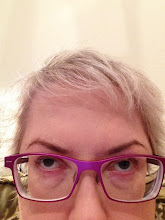Hi all, this here is my first ever #FridayFlash (and probably my last - don't know how I had time to do this one!)
Although it's my #FridayFlash debut, I'm not asking you to take it easy on me; be honest, please, especially if you think it's overly verbose! I can take it. I'm a big girl.
And so I give you;
The Shades of Chawton
They walk through the empty rooms and I watch them. Most of them have insipid, dilute emotions, like muddy puddles. They seem barely alive.
Others have emotions that quiver from their skin, but the colours are unpleasant, disturbing. Saffron-yellow curiosity burns across some; avarice oozes from others, a peculiar greeny-brown shade that I find I cannot look at for too long. I feel it sucking at me.
They all stop at the table. The avaricious ones try to touch it, leaning just so far across the yielding red-rope, that barrier that is no barrier at all but to polite society. The avaricious ones are not of polite society. That little lean, that reach of the fingers, the casual glance for potential observers; all of these offend me. I stay at the back of the room and watch, motionless. I will not gift them even an inkling of my presence.
Then there are the dramatics; those who visit this place as though they are making a pilgrimage. Red and blue ripple across their surfaces, alternating and undulating, as their focus veers from suppressed emotion to a desire to inhale history. They would never attempt to touch the table, no; that would be sacrilege, but they will stand, and gaze, and hope to be observed by other dramatics as they too stand, and gaze, and wonder.
When they have left for the night, and the house settles its skirts with a few quiet moans, then I return to my table, and I look deeply, penetratingly at the crack that runs along it now, not quite bisecting it. I push all my focus onto it, the world shrinking down to the span of a fault in a piece of polished wood; then I am in the crack, my favourite place, spreading out and filling it. We fit each other perfectly. I lie there all night, snug, feeling the echo of layer upon layer of crafted words rest on top of me like so many goosedown quilts.
Tonight as I was drifting idly through the spectral strata of layered words I was disturbed by a noise. After all this time I know all the common noises; the settling in summer, the expanding creak during the day; the moans of complaint in winter; the rattle of the panes. I knew this sound, too. It was the complaint of the door to this room as it opened. The house had been vacated at least an hour previously; who could this be?
The shape of a woman grew visible. I couldn't make out her features, yet I recognised her. She was one of the visitors from earlier, a quiet respectful one. Her emotions had glowed a pale clear blue, quite pleasant to behold.
As she approached the table, my table, her colour changed. Blue blurred towards amber, glowing and hot. I knew it as the colour of love, though I seldom witnessed it these days. I stared, confounded at the change.
She walked quickly towards the table, clambered over the faded red rope, and stared down at it. At me. She extended a hand towards us, further, further - then froze. I gazed at her in perplexity. She hadn't looked like a table-toucher, yet here she was.
'I'm sorry,' she said. Startled, I expanded slightly in the crack. The old table protested around me. Could she see me? Did she know I was there?
'I know I shouldn't,' she continued. 'No-one is supposed to touch your table, but I feel such a need to tell you what you mean. To me. Your words...'
Ah. My words. They mean much to me, too. I've seen the odd purple-hued devotee before. They enter this house lightly, reverently, as though it were a shrine. Which, in a peculiar way, I suppose it is. But they are never touchers. They, like I, are sticklers for the rules of society.
The woman's hand, motionless for several moments, had begun to shake.
'I'm sorry,' she said again, before her hand resumed its journey towards the surface of my table. Her amber glow grew even brighter, lighting up her face. She was not beautiful by any means, but her face was interesting, animated. Much as my own was described during my lifetime.
Shocked, I remained motionless, watching as her fingers reached the table and began lightly caressing the grain, tracing the edges, and finally making their way to the crack. My crack. I knew I should leave, remove to my corner, but I was lulled by her light and her love. One finger traced lightly all along the fault, sensuously, and I shivered. Growing bolder, she stepped nearer still and splayed her fingers all along the crack, fingertips probing it and me, while her thumbs hovered. She drew her hands away from each other, feeling her way all along the rift in the wood as though it were an engraved message on a tombstone. She probed, and quested, and inspected all of it, her fingers thrumming over my consciousness as she did so.
'Miss Jane Austen, I want to thank you,' she murmured. I quivered with surprise at her correct form of address, I have heard it so seldom in recent decades.
'Thank you for living. Thank you for writing. And thank you for being you.'
That was it. Nothing flowery. She did not read me a poem, or rave about a character, or quote me to myself. I admired her dignity. I forgave her. I made a decision.
I reached out my consciousness, drew up my energies. I focused, seeing and feeling each of her fingertips; and I touched her. Just a caress, a delicate sweep across her nerve endings. She startled, but did not remove her fingers immediately. Instead she inhaled, one two; then exhaled, three four; then lifted her hands slowly to her face and put her fingers to her mouth, like a child who has received a hurt.
Or a gift.





![[CreativeWriter_liar.jpg]](http://2.bp.blogspot.com/_3E7_2rxKKj4/S5azMcxgcdI/AAAAAAAAALo/uL28M_M2BOQ/s1600/CreativeWriter_liar.jpg)









